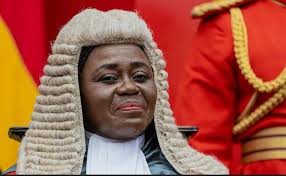The Chief Justice of Ghana, Her Ladyship Justice Gertrude Araba Esaaba Sackey Torkonoo, has been officially removed from office after a presidential directive confirmed findings of stated misbehaviour and incompetence. The decision, which took effect on September 1, 2025, was announced in a statement issued by the office of President John Dramani Mahama.
According to the presidency, the removal was carried out under Article 146(9) of the 1992 Constitution, which obliges the president to act in line with the recommendation of a committee established to investigate such petitions. The announcement brings to an end months of legal and political debate surrounding the Chief Justice, who had faced growing criticism from members of the public and sections of the legal community.
The matter began earlier in the year when three separate petitions were submitted against the Chief Justice. The petitions accused her of misbehaviour and incompetence, raising questions about her ability to continue holding the highest judicial office in the country. One of the petitions was filed by Mr. Daniel Ofori, a Ghanaian citizen who formally requested an inquiry into her conduct.
In April 2025, President Mahama, acting under the powers granted to him by Article 146(6) of the Constitution and after consultation with the Council of State, suspended Justice Torkonoo from office. He also established a committee to investigate the allegations. The suspension was intended to allow an independent inquiry without interference from the office of the Chief Justice.
The committee was mandated to carefully examine the petitions, listen to evidence from all parties, and make a recommendation based on constitutional provisions. After several months of proceedings, the committee submitted its report to the president. The findings revealed that the allegations of stated misbehaviour had been proven, and the panel recommended her immediate removal from office.
The presidency’s statement emphasised that the president had no discretion in the matter once the committee’s recommendation was made. Under Article 146(9), the president is required to act strictly in accordance with the panel’s conclusions, which in this case led to the dismissal of the Chief Justice.
Justice Gertrude Torkonoo, who became Ghana’s Chief Justice in 2023, was among the country’s most senior female judges. Her appointment at the time was widely celebrated as a milestone for gender representation in the judiciary. However, her tenure has been marked by criticism, with some accusing her of poor administrative leadership and questionable decisions in the management of the courts.
Legal analysts in Accra say the ruling is significant as it reinforces the principle that no official is above accountability, not even the Chief Justice. They note that the removal process followed constitutional procedure, starting with a petition, establishment of a prima facie case, suspension from office, a full committee inquiry, and a presidential directive based on the panel’s recommendation.
The development has sparked conversations in Ghana’s political and judicial circles. Some members of the legal community say the decision will help strengthen public trust in the judiciary by showing that misconduct, whether real or perceived, will not be overlooked. Others, however, worry about the possible impact on the stability of the judiciary at a time when the country is grappling with political and economic challenges.
The removal also raises questions about succession. With Justice Torkonoo now out of office, the responsibility falls on President Mahama, in consultation with the Council of State, to appoint a new Chief Justice. Observers expect the appointment process to attract intense public interest, as the judiciary plays a central role in upholding constitutional governance in Ghana.
For now, Justice Torkonoo’s removal marks the end of her leadership at the Supreme Court and stands as one of the most dramatic developments in Ghana’s judiciary in recent years. The outcome also highlights the power of constitutional provisions to hold even the most senior officials accountable through due process.
